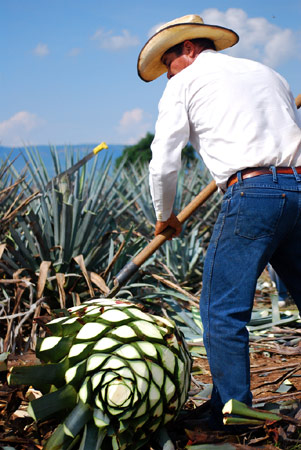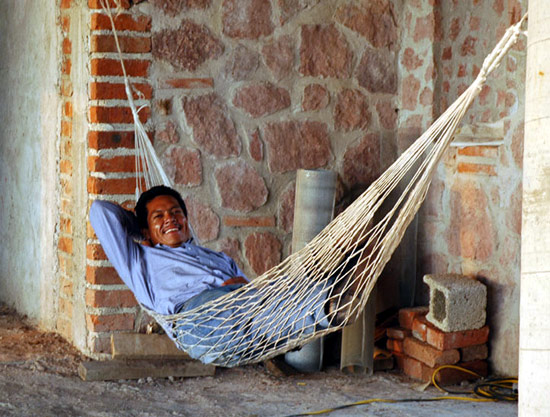Culture and Society: Time Orientation
Perception of Time
The perception of time in Mexico is governed more by where you are than who you are. While large modern cities like Mexico City and Monterrey adhere to the same precise fast pace that governs most industrial capitals, much of the population of the Mexican countryside follows the agricultural cycles of the sun and rain. In between these extremes, the typical Mexican town runs at a relaxed pace, where everyone seems to move about leisurely, yet business always seems to be taken care of.
Mexicans' perception of time is strongly influenced by both the Catholic Church and the elaborate calendars of the ancient civilizations that once thrived here. While most Mexicans believe in an afterlife of potential salvation and a world created at a moment in time by an all powerful God, parallel worlds where the dead still live pervade popular belief. Wherever you are in Mexico, festivals and celebrations dot the local calendar, putting the machinations of the business world on pause for days in even the largest cities.
Traditional Calendar
The pre-Colombian societies of Mexico devised some of the most intricate and precise calendars ever invented. The Mayan calendar, which is still followed by modern day Mayans in the southern state of Chiapas and in the Yucatan, is in fact actually more accurate than the Gregorian calendar, which has become the international standard. It not only tracked the path of planets like Venus, important for keeping track of river levels, but was able to stay on track without skipping a day every four years, unlike the Gregorian calendar with its leap year. The Mayan calendar uses a series of interlocking wheels, much like toothed gears, that give thousands of different combinations, allowing both short and long periods of time to be recorded and measured.
Another, similar, calendar was used in central Mexico by the mighty Aztec civilization and the many ancient societies that preceded it. Like the Mayan calendar, the Aztec calendar consists of interlocking wheels of different lengths and follows several different cycles.
Both of these ancient calendars feature prominently in Mexican art and crafts and have spawned a worldwide resurgence in ancient calendar systems. Some even believe that these meso-American time systems indicate the beginning and end of time on earth and human history.
Attitude Toward Time
Mexicans are famous for their flexible attitude towards time, once epitomized by the word “mañana” (tomorrow) that was supposed to be the Mexican’s stereotypical response to the question “when will it be done?”. The truth is, however, that promptness and reliability are always appreciated in business settings, and many modern Mexicans don’t have the kind of leisure time they had when the country was less urban and industrial. Generally speaking, relationships are valued more than schedules in Mexico; so, the better one knows someone, the more leeway there is in terms of punctuality.
In smaller towns and in residential areas of large cities, many family run businesses do not always adhere to the posted hours on the front door, and the afternoon siesta, which is enjoyed throughout the country, often continues through the evening if a particularly important fútbol match is on television or a family celebration is taking place. Even governmental offices in smaller, less industrial areas take the same loose attitude towards standardized hours and are often closed when the sign says otherwise. On the flip side of this, Mexicans detest waiting in long lines, so the kind of waits experienced in many public facilities in North American cities are seldom encountered in Mexico.
Social Engagements
Arriving late to dinners, parties, and other social events is not frowned upon in Mexico the way it is in North America and Europe. In fact, it's preferable, as arriving at the stated hour may mean actually getting to the party while it is still being set up. This is a fact that is tempered by moderation, however, and guests that are invited to special events like birthdays and weddings are expected to arrive before the formal ceremonies and presentations take place.
Dinners in Mexico usually start only after 9p.m. and can go on until midnight. Likewise, going out on the town begins relatively late in Mexico, after a leisurely dinner has been finished. Personal scheduling is often very informal in Mexico and it is common for persons to commit to more events than they know they can or will attend in order to keep options open until the last minute.
Business Engagements
Business meetings are scheduled well in advance and are usually confirmed multiple times to make sure that they still conform to everyone’s schedules. The first business meeting is an organized affair held at an office, with subsequent meetings often held over meals. Business breakfasts (between 8a.m. and 11a.m.) are popular in Mexico, while lunch meetings held during the siesta between 2p.m. and 5p.m. are mostly reserved for social interaction.
Meetings typically start late, negotiations often proceed at a slow pace, and decisions are arrived at only after extensive and often animated discussions. Often offers are withheld until midway through the meeting until formalities are complete and a certain comfort level has been reached.
The preferred time for business visits to Mexico is January to June and September to November due to the hot Mexican summers. The two weeks around Christmas and Easter should be avoided since little if any work takes place during these periods. Mexicans value long-term business relationships and often insist on frequent visits and regular contact once a relationship is established.
Article written for World Trade Press by Ocean Malandra.
Copyright © 1993—2024 World Trade Press. All rights reserved.

 Mexico
Mexico 
